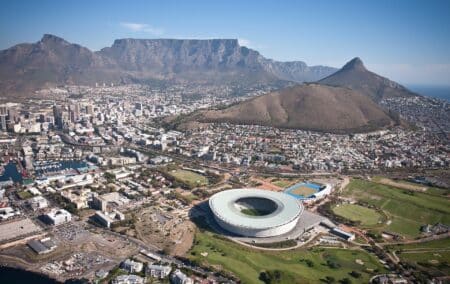A war of words and threats has emerged as a result of the DA’s Western Cape Provincial Powers Bill (WCPPB). This piece of legislation, which aims to achieve greater devolution to the Western Cape government, has been branded as “secessionist” by the ANC, with its allies in the SACP vowing to make the province “ungovernable”. For a supposed liberation movement that brought “democracy” to South Africa, the SACP is seeking to undermine democracy in the Western Cape at every opportunity.
I was due to deliver an oral submission at the WCPPB public hearing in Moorreesburg on 30 January 2024. Upon my arrival at the packed town hall, there was a sizable protest taking place inside the venue (consisting of mostly ANC members), in an attempt to delay the start of the proceedings. The event was scheduled to start at 5pm, yet the protests continued. This culminated in the event being suspended at 6pm, with no presentation or statements being made.
Throughout this entire ordeal, there was a significant police presence outside the venue, yet they either were not asked to or refused to intervene to remove the unruly ANC members. In Moorreesburg at least, the ANC had succeeded in making the event “ungovernable”.
The same disruption took place a few days later at the Provincial Parliament. A large contingency of ANC and EFF supporters stormed the building and attempted to break through a metal security barrier to gain access to the parliamentary chamber. “One settler, one bullet” was chanted as they did so.
The ANC has framed its fight against the WCPPB as a fight against the white minority, and is thus using the language of the struggle to justify using any tactics to oppose it. In reality, it is up against the overwhelming majority of Western Cape people from all races and backgrounds who seek greater autonomy for the province, and have demonstrated this by overwhelmingly voting for pro-autonomy parties in recent elections.
Disregard
These recent actions by the ANC represent a clear disregard for the democratic will of the Western Cape people and their right to self-determination. Its actions are tantamount to imperialism. The ANC exploits and loots the money of Western Cape taxpayers. It imposes legislation that fails to prevent the crisis of mass land invasions. When a decision does not go its way in the province, it announces its intention to bring about chaos and instability. At no point have the Western Cape people been asked about their concerns and when they do, they are branded with the most terrifying word in South African politics: “racist”.
During its time in government, the DA has been remarkably unsuccessful in delivering autonomy for the Western Cape. While the WCPPB is a step in the right direction, on its own the legislation is largely futile and continues to leave us at the mercy of a corrupt ANC national government (which will likely continue to be in government after the elections). In 2019, Premier Alan Winde was elected on a manifesto of fighting for devolution of policing and rail to the Western Cape government. For the past five years, not only have these requests been constantly denied, but ridiculed by the national government.
Devolution is not the solution
If the DA is serious about protecting the well-being of the Western Cape people, it must recognise that devolution is not the solution. The Western Cape people desire and need control over their economic policy, their security policy, their border policy, and their tax money. This is something only Cape independence can deliver.
If the people of the Western Cape want Cape independence, they are going to have to vote for it in 2024. Independence parties have grown considerably in recent years, and with a consolidation of efforts likely to occur in the lead-up to these critical elections, they pose a serious threat to the DA’s provincial majority. If the DA loses just over 5 percentage points of the provincial vote to secessionist parties, they will be forced into a coalition government.
If this happens, a coalition with either the FF Plus or Referendum Party, or both, would lead to a referendum on Cape independence.
An independent Cape, making its own laws, determining its own international relations, and controlling its own borders, would not be chained to the disastrous policies and consequences of an ANC government. It would be able to achieve its potential, and would enable the people of the Western Cape to build a first-world country on Africa’s southern tip, reigniting the hope for the future that many felt with the advent of democracy in 1994.
It would also serve as a blueprint and a beacon of hope for the millions of people across South Africa who want to make a change, but currently feel powerless. At the very least, it could lead to a fundamental reconstruction of the South African project, turning it to one which prioritises the community first.
The views of the writer are not necessarily the views of the Daily Friend or the IRR
If you like what you have just read, support the Daily Friend

